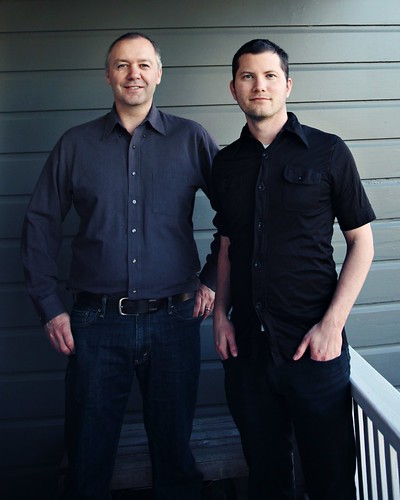
PeerJ Founders Peter Binfield and Jason Hoyt / Duncan Hull / CC BY
In their excellent Washington Post opinion piece, Matt Cooper and Elizabeth Wiley suggest that federally funded research should be freely accessible over the Internet. They argue that when students lose their access to academic databases after graduation, society doesn’t get the same benefits it could from that research:
Students’ library cards are a passport to the specialized knowledge found in academic journal articles — covering medicine and math, computer science and chemistry, and many other fields. These articles contain the cutting edge of our understanding and capture the genius of what has come before. In no uncertain terms, access to journals provides critical knowledge and an up-to-date education for tomorrow’s doctors, researchers and entrepreneurs.
But should that access cease at graduation? Or would you rather a graduating medical student, perhaps your future doctor, be able to keep up with the latest advances? Would you rather an ambitious graduate student feel comfortable leaving the academy to found the next Google, knowing she still has access to the latest insight in her field and is able to build upon it?
Cooper and Wiley’s organizations — the National Association of Graduate-Professional Students and the American Medical Student Association, respectively — joined Creative Commons and many other allies in support of a petition on Whitehouse.gov for free access to scientific journal articles arising from taxpayer-funded research. The petition quickly reached its goal of 25,000 signatures, sending a clear message that it’s time for the government to rethink open access policies.
Meanwhile in Britain, the Minister for Universities and Science recently commissioned a study on how the UK could adopt open access for publicly-funded research. Dame Janet Finch and her team released their findings last week, championing in particular the “gold” route to open access.
But how do the publishers themselves fit into the discussion? Some are actively exploring open access publishing models. This month, Peter Binfield and Jason Hoyt unveiled PeerJ, a new kind of peer-reviewed academic publisher. Contributors pay a $99 lifetime membership fee, and all articles are licensed CC BY. Funded by Tim O’Reilly, PeerJ has been getting a lot of attention in the mainstream press.
Coincidentally, science publishing stalwart Nature has also adopted the CC BY license, through its open access component Scientific Reports. Previously, researchers could choose whether to license their works BY-NC-SA or BY-NC-ND. Starting July 1, they’ll have the CC BY option as well. Nature’s Jason Wilde explains the decision to drop the required noncommercial stipulation:
There has been much debate about commercial reuse on open access articles […] We believe in offering our authors choice. And we now know some authors will want to choose CC BY, not least as a result of new funder mandates. Unlike Nature Communications and our other titles, Scientific Reports does not have established revenues from commercial reprints or licensing, making it an economically viable proposition.
With governments, publishers, and the public all rethinking ways to make research more freely accessible, the climate seems right for a major shift toward open access.
Related: First Thoughts on the Finch Report: Good Steps but Missed Opportunities (Cameron Neylon)







Open access journals are great, and I think we can take open access further than the massaged data and polished figures in publications. For instance, the lab notebook is considered University Property, and this is often strictly enforced (lab members cannot take the paper notebook with them after they leave the lab). Tools like OpenWetWare (OWW) Notebooks make my “University property” accessible the entire internet community. I also think that wiki-style biology repositories (Like the iGEM Parts Registry) are a good way to go, as long as data reporting is standardized so that it is genuinely useful.
I support this effort wholeheartedly. Federally funded research should be freely accessible over the net. It will aid in the advancement of more solutions, cures and inventions.
There are several challenges facing you if you want to publish your work in an open access venue. One is finding the funds necessary to cover publication charges, whether from a grant, institutional sources, or your own deep pockets.